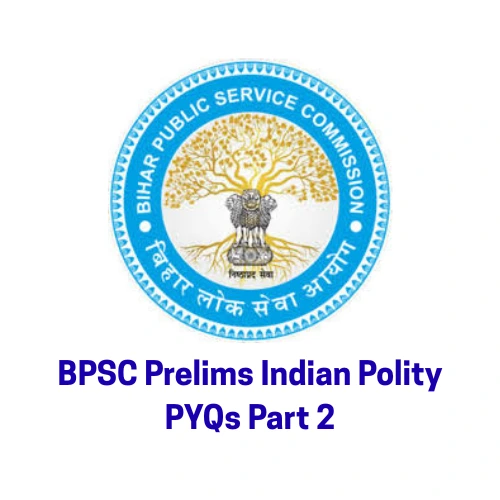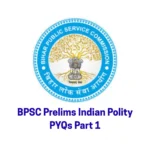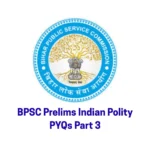The Polity section in BPSC Prelims PYQs Part 2 highlights the importance of understanding India’s constitutional framework. Previous questions frequently revolve around constitutional articles, amendments, and landmark provisions. Candidates are expected to be well-versed in the functioning of Parliament, state legislatures, judiciary, and the relationship between Union and States.
BPSC Prelims Polity PYQs Part 2
Consider the following statements regarding the 42nd Amendment to the Constitution of India:
1)It added three words to the Preamble- ‘Socialist’,’Secular’ and ‘Integrity’.
2)It added eight Fundamental Duties to the Constitution.
3)It added new Directive Principles, i.e., Article 39A, Article 43A and Article 47.
4)It granted power to the President, in consultation with the Election Commission, to disqualify members of the State
(a) 1 and 2
(b) 1, 3 and 4
(c) 1 and 3
(d) 1, 2, 3 and 4
Ans: (c)
The ‘White Paper’ is the official report of the Government of which of the following countries?
(a) USA
(b) France
(c) Britain
(d) India
Ans: (d)
Which Article of the Indian Constitution empowers the Parliament to form a new state?
(a) Article 1
(b) Article 2
(c) Article 3
(d) Article 4
Ans: (c)
Which of the following is the largest committee of the Indian Parliament?
(a) Committee on Public Accounts
(b) Committee on Estimates
(c) Committee on Public Undertakings
(d) Committee on Petitions
Ans: (b)
Which of the following constitutional amendment provided the Right to Education?
(a) 86th Constitutional Amendment, 2002
(b) 93rd Constitutional Amendment, 2005
(c) 44th Constitutional Amendment, 1978
(d) 97th Constitutional Amendment, 2011
Ans: (a)
Indian Polity PYQs with Answers
Consider the following statements:
Only the Central Government can make laws regarding the Union List subjects.
Only the State Governments can make laws regarding the State List subjects.
Both the Centre and the State Governments can make laws regarding the Concurrent List subjects.
In case of conflict, the State law on a Concurrent List subject prevails.
Which of the above statements is/are correct?
(a) 1, 2 and 3
(b) 1, 2 and 4
(c) 1 and 3
(d) 2, 3 and 4
Ans: (c)
Consider the following statements about the role of the Cabinet Committees:
They are constitutional bodies.
They are generally headed by the Prime Minister.
They are appointed by the Prime Minister.
Which of the above statements is/are correct?
(a) Only 1
(b) Only 1 and 2
(c) Only 2 and 3
(d) 1, 2 and 3
Ans: (c)
Match the following political parties listed in List–I with their years of establishment in List–II
List-I (Political Parties) | List-II (Years of Establishment)
A. Communist Party of India (Marxist) | 1. 1964
B. Communist Party of India | 2. 1998
C. Bahujan Samaj Party | 3. 1925
D. All India Trinamool Congress (AITC) | 4. 1984
Select the correct answer using the codes given below.
A B C D
(a) 1 3 4 2
(b) 2 1 4 3
(c) 2 1 3 4
(d) 3 4 1 2
Ans: (a)
Indian Polity Previous Year Paper
Which of the following articles provides for a common High Court for two or more states?
(a) Article 230
(b) Article 231
(c) Article 222
(d) Article 216
Ans: (b)
Which of the following is correct about the “Office of Governor”?
1)It is created by the Indian Constitution.
2)He/She is the head of the State Executive.
3)He/She acts as a constitutional head.
4)He/She is an agent of the Central Government.
(a) 1, 2, 3 and 4
(b) 1, 2 and 3
(c) 2 and 4
(d) 1, 2 and 4
Ans: (a)
Which of the following is correct about the “Collective Responsibility” of the Council of Ministers in a State?
(a) All ministers are responsible to the Governor for all their acts.
(b) All ministers are individually responsible to the Chief Minister.
(c) The entire Council of Ministers is responsible to the State Legislature.
(d) A minister can publicly express dissent on cabinet decisions.
Ans: (c)
BPSC Prelims Polity PYQs Part 2
Which Article states that the Governor shall be aided and advised by the Council of Ministers in the exercise of his functions?
(a) Article 163
(b) Article 162
(c) Article 161
(d) Article 165
Ans: (a)
Consider the following statements: In the post 73rd Amendment era, there has to be decentralization of
Decision making Powers
System as a whole.
Judicial Powers.
Administrative Powers.
Which of the above statements are correct?
(a) 1, 2 and 3 only
(b) 1, 2 and 4 only
(c) 2, 3 and 4 only
(d) More than one of the above
(e) None of the above
Ans: (b)
Which of the following statements is/are correct about the State Election Commission (SEC)?
The SEC is appointed by the Governor.
The SEC can be removed only in the manner and on the grounds as a Judge of the High Court.
The conditions of service and tenure of the SEC are determined by the Governor.
(a) Only 1
(b) Only 1 and 2
(c) 1, 2 and 3
(d) Only 2 and 3
Ans: (b)
Indian Polity Previous Year Paper
The State Finance Commission (SFC) is constituted for how many years?
(a) Five years
(b) Six years
(c) Ten years
(d) Two years
Ans: (a)
What is the minimum age to contest a Panchayat election?
(a) 21 years
(b) 25 years
(c) 18 years
(d) More than one of the above
(e) None of the above
Ans: (a)
At what level does a Panchayat Samiti operate a Panchayati Raj Structure?
(a) District Level
(b) Gram Panchayat Level
(c) Block-level body.
(d) More than one of the above
(e) None of the above
Ans: (c)
Generally how many sessions are there in the Lok Sabha?
(a) 4
(b) 5
(c) 6
(d) 3
(e) None of the above/More than one of the above
Ans: (d)
Which of the following is not a feature of a Parliamentary Government?
(a) Dual executive
(b) Secrecy
(c) Fixed tenure
(d) Collective responsibility
(e) None of the above/More than one of the above
Ans: (c)
Which of the following articles is not required to be amended to realize the concept of ‘One Nation One Election’ in India?
(a) Article 83
(b) Article 172
(c) Article 246
(d) Article 356
(e) None of the above/More than one of the above
Ans: (c)
BPSC Prelims Polity PYQs Part 2
Which state does not have a Panchayat System?
(a) Mizoram
(b) Meghalaya
(c) Kerala
(d) Nagaland
(e) None of the above/More than one of the above
Ans: (e)
In which year was the ‘National Commission for Backward Classes’ established?
(a) 1993
(b) 1980
(c) 1978
(d) 1992
(e) None of the above/More than one of the above
Ans: (a)
Which Article of the Indian Constitution is associated with the ‘right to Constitutional Remedies’ for Indian Citizens?
(a) Article 30
(b) Article 31
(c) Article 32
(d) Article 33
(e) None of the above/More than one of the above
Ans: (c)
Who among the following called Article 32 as the ‘heart and soul’ of the Constitution?
(a) Dr. Rajendra Prasad
(b) B. R. Ambedkar
(c) Jawaharlal Nehru
(d) Sardar Vallabhbhai Patel
(e) None of the above/More than one of the above
Ans: (b)
Consider the following pairs:
Articles | Provisions
Article 155 | Appointment of the Governor
Article 156 | Term of office of the Governor
Article 154 | Executive power of the State
Article 153 | Governor of State
How many of the above pairs are correctly matched?
(a) Only one pair
(b) Only two pairs
(c) Only three pairs
(d) All four pairs
(e) None of the above/More than one of the above
Ans: (d)
Indian Polity Previous Year Paper
The process of the President’s impeachment in India is referred to as:
(a) Semi-Judicial Process
(b) Judicial Process
(c) Legislative Process
(d) Executive Process
(e) None of the above/More than one of the above
Ans: (a)
Who was allotted the Portfolio of the Labour Department in the Interim Government’s cabinet of 1946 AD?
(a) Dr Rajendra Prasad
(b) Dr Anugraha Narayan Sinha
(c) Syed Ali Zaheer
(d) Jagjivan Ram
(e) None of the above/More than one of the above
Ans: (d)
In which year was the first state finance commission constituted in Bihar?
(a) 1993
(b) 1994
(c) 1995
(d) 1996
(e) None of the above/More than one of the above
Ans: (d)
Which Article of the Constitution of India provides that the Vice-President of India shall be the ex-officio Chairman of the Council of States?
(a) Article 61
(b) Article 64
(c) Article 65
(d) Article 68
(e) None of the above/More than one of the above
Ans: (b)
Under which Article of the Constitution is the Attorney General of India appointed?
(a) Article 79
(b) Article 76
(c) Article 78
(d) Article 74
(e) None of the above/More than one of the above
Ans: (b)
How many subjects are contained in the Eleventh Schedule of the Indian Constitution, which deals with Panchayats?
(a) 29
(b) 28
(c) 30
(d) 32
(e) None of the above/More than one of the above
Ans: (a)
BPSC Prelims Polity PYQs Part 2
Which one of the following is not a subject under the Eleventh Schedule of the Constitution of India?
(a) Non-conventional energy sources
(b) Khadi, Village and Cottage Industries
(c) Higher education
(d) Technical Training and Vocational Education
(e) None of the above/More than one of the above
Ans: (c)
Which of the following is not a function of Panchayats?
(a) Public Distribution System
(b) Primary and Secondary Schools
(c) Maintenance of Community Assets
(d) Higher Education
(e) None of the above/More than one of the above
Ans: (d)
How many [number] “Demands for Grants” are put before the Parliament as a part of the Annual Budget in pursuance to Article 113 of the Constitution?
(a) 98
(b) 96
(c) 104
(d) 109
(e) None of the above/More than one of the above
Ans: (e)
What is the maximum number of judges (excluding the Chief Justice) sanctioned for the Supreme Court of India?
(a) 33
(b) 31
(c) 30
(d) 25
(e) None of the above/More than one of the above
Ans: (a)
BPSC Prelims Polity PYQs Part 2
Which of the following is/are the features of the Indian Constitution?
Written Constitution
Parliamentary Sovereignty
Judicial Supremacy
Federal System
(a) 1, 2 and 3
(b) 1, 3 and 4
(c) 1 and 4
(d) 1, 2, 3 and 4
(e) None of the above/More than one of the above
Ans: (b)
In the Indian context, what is the ‘Hedge System’ of Administration?
(a) System where there are both experts and generalists.
(b) System where experts are separated from generalists.
(c) System where policy-making is separated from administration.
(d) None of the above.
(e) None of the above/More than one of the above
Ans: (c)
With reference to the Finance Commission of India, consider the following statements:
The Finance Commission is a statutory body.
The Finance Commission was set up under Article 280 of the Constitution.
The recommendations made by the Finance Commission are only advisory in nature.
The first Finance Commission was set up in 1950.
Which of the above statements are correct?
(a) 1 and 2
(b) 2 and 3
(c) 1, 2 and 3
(d) 1, 3 and 4
(e) None of the above/More than one of the above
Ans: (b)
Which Constitutional Amendment has provided for the establishment of an Administrative Tribunal?
(a) 44th Constitutional Amendment
(b) 59th Constitutional Amendment
(c) 42nd Constitutional Amendment
(d) 43rd Constitutional Amendment
(e) None of the above/More than one of the above
Ans: (c)
The doctrine of ‘Pith and Substance’ is related to which of the following?
(a) The principle of separation of powers between the executive and the judiciary.
(b) The principle of territorial nexus in tax legislation.
(c) The distribution of legislative subjects between the Centre and the States.
(d) The principle of ‘colorable legislation’.
(e) None of the above/More than one of the above
Ans: (c)


